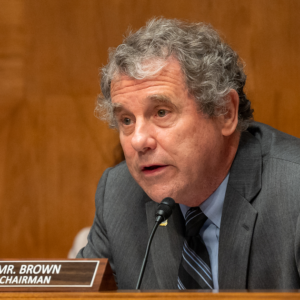Economists, Free Market Groups Urge Congress to Reject RECOUP Act

A group of economists and center-right free market organizations sent a letter to congressional leaders Tuesday urging them to reject the so-called RECOUP Act. They warned it could weaponize the U.S. banking system and undermine America’s already-eroding public trust in political institutions.
“As leaders of policy groups concerned with constitutional liberties, government accountability, and the abuse of power, we urge you to reject the dangerous and misguided S. 2190, the RECOUP (Recovering Executive Compensation Obtained from Unaccountable Practices) Act,” the letter begins, signed by 36 right-of-center groups. It was sent to Speaker of the House Mike Johnson (R-La.), Senate Majority Leader Chuck Schumer (D-N.Y.) and the two minority leaders, Rep. Hakim Jeffries (D-N.Y.) and Sen. Mitch McConnell (R-Ky.)
According to a one-pager from the U.S. Senate Banking, Housing and Urban Affairs Committee, chaired by populist Democrat Sen. Sherrod Brown (D-Ohio), the bill would let the Federal Deposit Insurance Corporation (FDIC) “claw back senior executives’ compensation received in the 24 months prior to a bank’s failure, including incentive-based, equity-based, or performance-based compensation, as well as profits realized from selling the bank’s stock.”
The authors of the letter, however, focus on a less-publicized aspect of the legislation: The power it gives unelected bureaucrats in the federal government to intervene in private businesses.
“The RECOUP Act would increase financial regulatory agencies’ powers excessively by allowing them to remove the leadership of any U.S. bank they supervise, even if the agency doesn’t deem such a bank as at risk of going under,” the letter reads.
That’s the concern of John Berlau with the Competitive Enterprise Institute.
“The signatories urge Congress to halt the legislation that gives bank regulators massive new powers to remove bank leadership for vaguely defined ‘risk control’ failures that could include simply doing business with politically disfavored industries,” Berlau told InsideSources. “The policy leaders express particular concern that Congress will insert the legislation into a must-pass bill to bypass important debate about the RECOUP Act’s harmful, far-reaching provisions.”
Among the groups who signed the letter are Americans for Tax Reform, FreedomWorks, Americans for Prosperity and the American Energy Alliance. (The entire letter and its signatories can be found here.)
Benjamin Zycher, a Senior Fellow at the American Enterprise Institute, says the RECOUP Act “would increase sharply the politicization of lending and bank investments — and thus the aggregate productivity of capital allocation — by empowering financial regulators to remove bank executives for a failure ‘to appropriately implement financial, risk, or supervisory reporting or information system or controls.’ That language is so broad as to be essentially meaningless, limited only by the political preferences of the regulators.
“This would represent a vastly expanded version of Operation Choke Point,” Zycher warned.
Operation Choke Point was an Obama administration attempt to cut off access to banking services by industries disfavored by the White House, such as gun dealers, payday lenders and some tobacco vendors. Obama’s FDIC warned banks of “unsatisfactory Community Reinvestment Act ratings, compliance rating downgrades, restitution to consumers, and the pursuit of civil money penalties” if they continued to do business with unfavored industries.
“The RECOUP Act is flawed under any circumstances, but its boosting of the powers of financial regulatory agencies before these troubling issues are resolved would almost certainly lead to new abuses of power,” the letter reads. “We are also particularly concerned about provisions of the RECOUP Act being added to a must-pass appropriations bill. This approach would deny members of Congress the opportunity for basic debate of the far-reaching impactful provisions of the legislation.
“For these reasons, we urge you to reject the RECOUP Act as a stand-alone bill or if added to other legislation.”
The RECOUP Act was passed by the Senate Banking Committee but has yet to receive a vote from the full Senate.



